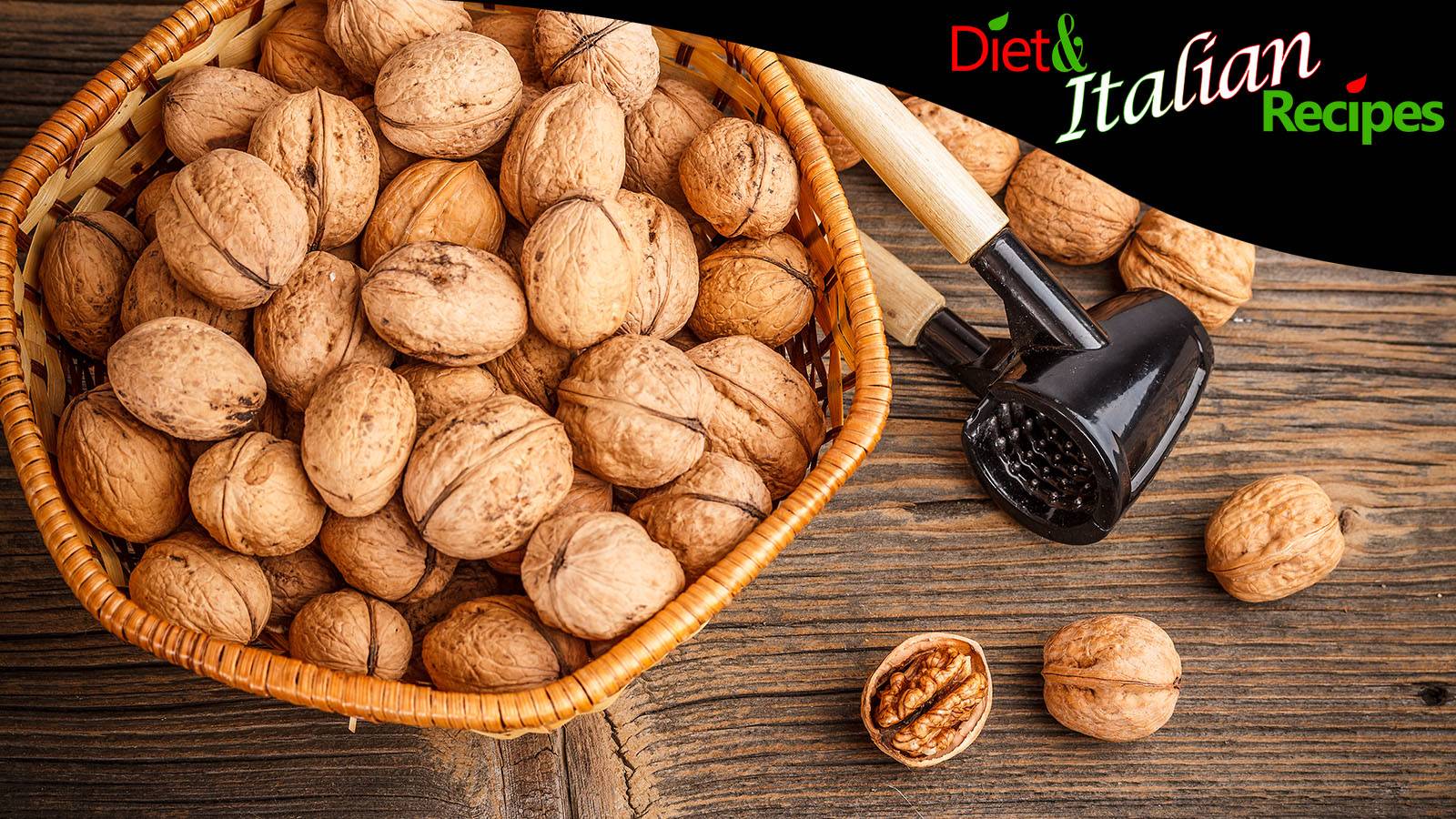The benefits and properties of walnuts, including their calories, nutritional values, and potential side effects in specific cases, will be explored. Additionally, we will discover which diseases and disorders can be alleviated by regular consumption of walnuts. Curious about how many calories are in a walnut? What do walnuts contain? When is the best time to eat them? Are they good or bad for you? Can you eat them during pregnancy and breastfeeding? The answers to these simple questions may surprise you, especially as you realize that walnuts are an underrated food that truly deserves a place in our daily nutrition.

Calories in Walnuts
Benefits of Walnuts – How many calories are in a walnut? To know how many calories a walnut has, it is important to note that a single walnut weighs about 5 grams. Considering that walnuts have 689 calories (kcal) per 100 grams, the result is that a single walnut contains only 34 calories (kcal).
Do fresh walnuts have the same calorie content as dried, roasted, or shelled walnuts? No, in fact, fresh walnuts have 689 kcal per 100 grams, but the same quantity of dried walnuts provides 660 kcal, while roasted walnuts only have 324 kcal. Shelled walnuts are usually fresh, so their caloric content is the same. Therefore, to eat walnuts with fewer calories, all you need to do is toast them in a pan for about twelve minutes (without adding oil) and stir them frequently, just as you would with hazelnuts or almonds.
Due to the numerous properties and benefits of this fruit, we often wonder how many calories are in 3, 4, 5… 10 walnuts? Here is a list that you should keep in mind:
- 1 walnut has 34 calories or kcal;
- therefore:
- 3 walnuts have 102 calories or kcal;
- 4 walnuts have 136 calories or kcal;
- 5 walnuts have 170 calories or kcal;
- and 10 walnuts have 340 calories or kcal.
Nutritional Values: What do walnuts contain?
Benefits of Walnuts – Calories do not indicate the content or nutrient value of nuts, which is why we rely on the nutritional values of walnuts (always per 100 g) to learn more:
- Water 19.20 g;
- Carbohydrates 5.50 g;
- of which complex carbohydrates 1.90 g;
- Soluble sugars 3.40 g;
- Protein 10.50 g;
- Fat 57.70 g;
- of which saturated fat 0 g;
- Cholesterol 0 g;
- Total fiber 3.50 g.
A note on the nutritional values and properties of walnuts is reserved for proteins, which represent at least 10.5% of the food, at least according to My Personal Trainer, which we consider a reliable source. Athletes love nuts and walnuts because they provide good amounts of fiber and protein, especially arginine, an amino acid that promotes better circulation and stimulates growth hormone.
Walnuts contain minerals and vitamins, as well as nickel and others, specifically:
- Sodium 3 mg;
- Iron 2.60 mg;
- Calcium 131 mg;
- Phosphorus 238 mg;
- Thiamine (vitamin B1) 0.58 mg;
- Riboflavin (vitamin B2) 0.17 mg;
- Niacin (vitamin B3 or PP) 0.80 mg;
- Vitamin A 6 µg;
- Vitamin E 3.85 mg;
- traces of Vitamin C;
- Omega 3 at 9%;
- rich in Nickel;
- the glycemic index of walnuts is 15.
Benefits of Walnuts – It is equally important to note what walnuts do not contain: gluten, in fact, they are among the recommended fruits for celiac disease. This is all there is to know about the composition of walnuts, recommended in case of anemia, diabetes, celiac disease or for athletes, but not recommended for those allergic to nickel.
They are a food low in uric acid, in fact, for 28 g of walnuts, there are only 7 mg of purines, very little compared to peanuts (22 mg) or almonds (10 mg).
Discover the recipe for nocino, the homemade liqueur made with green walnut husks.
Properties and Benefits: Walnuts are good for cholesterol and don’t cause weight gain
Benefits of Walnuts – Walnuts belong to the nut family and are very nutritious fruits, rich in numerous nutrients and benefits for our body. Firstly, they are a source of plant proteins, omega-3 fatty acids, and nourishing energy (calories that satisfy our nutritional needs), so they should never be excluded from our diet unless there is a good reason to do so.
The properties and benefits of walnuts are truly numerous, confirming that they are really good for our health. Here are the main beneficial and nutritional properties that we should know:
- Thanks to the omega-3 fatty acids, which are good fats, walnuts are good for cholesterol by reducing bad LDL cholesterol, while also reducing inflammation.
- Ellagic acid is a beneficial antioxidant found in these nuts, and ongoing studies are investigating its anticancer properties.
- Walnuts contain natural melatonin, a substance that helps regulate our sleep and wake cycles.
- Rich in arginine, walnuts help nourish muscles by stimulating their growth, which is why they are so loved by athletes, particularly in the world of bodybuilding.
- As a “tonic for the nervous system,” walnuts also possess anti-anemic (due to their mineral content), antispasmodic, sedative, and anti-inflammatory properties.
- The balance of electrolytes favors the elastic tone of blood vessels, which in turn promotes arterial circulation.
- The magnesium contained in walnuts plays a decisive role against stress, and therefore they have pain-relieving, sedative, and anti-edema properties.
- According to the “signature theory,” the shape of the walnut kernel, which is very similar to that of a brain, would mean that this fruit has beneficial properties specifically for this important organ, and in fact, it does. Walnuts are rich in substances beneficial for the brain and nervous system, such as omega-3 and minerals such as iron, phosphorus, and magnesium.
- Finally, in addition to the above-mentioned benefits, we can affirm that walnuts have other properties: nourishing, draining, energizing, laxative, remineralizing, and vermifuge.
Do nuts make you gain weight or lose weight?
Benefits of Walnuts – These are the beneficial effects of nuts. To benefit from this nut, all you have to do is include it in your diet. However, there are still some people on a diet who wonder, “Do nuts make you gain weight?” Nuts do not make you gain weight. Although it is true that they are energizing and calorie-dense, in a balanced diet, nuts are always present, especially a handful of them, thanks to all their properties. So, “Do they make you lose weight?” Well, yes, nuts help you lose weight primarily because they suppress hunger pangs, helping you avoid indulgences. Also, being rich in fatty acids, they help our body lose weight by stimulating metabolism to consume fats.
How many nuts a day to lose weight? Just three nuts are enough to experience the weight-loss effects. Keep in mind that they provide 102 calories or kcal, so they are ideal for breakfast or a quick snack. No type of nut makes you gain weight, but the quantities must be controlled.
Nuts are good for cholesterol, lowering bad LDL cholesterol
Benefits of Walnuts – Nuts are undoubtedly useful in controlling cholesterol levels and overall cardiovascular risk. Some studies have shown that daily consumption of approximately 40-80 grams of nuts per day, following a balanced diet, has lowered bad LDL cholesterol by about 8-12 mg/dL, in favor of an unchanged or slightly increased level of good HDL cholesterol.
In addition, in scientific studies, polyunsaturated fats present in nuts have proven to be useful in reducing triglyceride levels. Vitamin E, along with omega-3 fats, constitutes an antioxidant bomb that counteracts the formation of atherosclerotic plaques.
How many nuts to eat per day to lower cholesterol? The recommended amount for this purpose is about 30 grams per day, so 6 or 8 nuts are enough to counteract high levels of LDL cholesterol.
When to eat walnuts: in the evening, at breakfast, before sleeping
Benefits of Walnuts – Eating walnuts in the evening is particularly recommended because, as we have seen, they contain enough melatonin to promote rest and better sleep quality. So, instead of indulging in a snack before bed, take advantage of the double benefit of the walnut, eat three of them, it helps you stay in shape, stimulates nighttime digestion and gently accompanies you into the world of dreams.
Eating them for breakfast won’t hurt either because they are energizing and rich in minerals and omega-3s, so they give you a boost and the right charge to face the day.
Walnuts and: diabetes, liver, hemorrhoids, constipation, colitis, prostate, pregnancy, kidney stones, and gastritis
Benefits of Walnuts – Now here are some curiosities and information about the benefits of walnuts associated with diseases and disorders such as diabetes, kidney stones, gastritis, constipation, and others.
Considering the nutritional properties, health benefits, and characteristics of this type of nut, we can say that:
- Walnuts and diabetes go hand in hand. In fact, diabetic patients have a high cardiovascular risk and must deprive themselves of sweets, so eating walnuts helps them fight hunger attacks, cardiovascular risk, and maintain glycemic control by promoting weight loss. Also, they slow down the glycemic response when eating carbohydrate-rich foods.
- The liver is relieved of its functions thanks to arginine, which helps purify and detoxify the liver, especially from ammonia.
- Hemorrhoids and walnuts are a winning combination. Those who suffer from inflamed hemorrhoids need to regulate the inflammatory processes of the body, an action that the walnut performs thanks to omega-3 and 6 fatty acids. To obtain the benefits, it is recommended to eat four per day.
- Walnuts also help those who suffer from constipation, as they have laxative properties that help empty the intestine, also due to the significant amount of fiber. However, be careful not to overdo it to avoid the opposite effect, namely diarrhea.
- Eating walnuts is good and protects against ulcerative colitis, but it is still essential to be careful and not consume more than 15 grams per day, especially if you also suffer from irritable bowel syndrome.
- Eating a handful of walnuts slows down prostate cancer, but consuming 70 grams can prevent the onset and even the growth of prostate cancer.
- Walnuts in pregnancy and breastfeeding are healthy for both the mother and the baby about to be born or newborn. In particular, they promote brain development and support it in the early stages of life through breast milk.
- Due to the presence of oxalates, it is not recommended to eat them for those who suffer from kidney stones.
- Walnuts and gastritis are not a functional combination. Nuts are too fatty to be indicated for those with gastritis problems.
Do nuts cause harm? We have realized that besides boasting a wide range of benefits, they also have some contraindications for specific cases, but they do not harm everyone.
Side effects and allergies
Benefits of Walnuts – We conclude this informative article with some notes on the side effects of nuts, for example, on those who suffer from allergies, and whether nuts can be eaten during pregnancy and breastfeeding.
We already know that those who suffer from gastritis, irritable bowel syndrome, or kidney stones should avoid dried fruit, but the consumption of nuts is also not recommended for those who are often prone to herpes since the arginine content can trigger its appearance.
In general, it is always better not to eat more than 10 nuts a day, also because you risk gaining weight and obtaining the opposite effect for cardiovascular health. Eating too many nuts causes bloating because it produces intestinal gas stimulated by abundant amounts of phytates and tannins, which are difficult to digest.
The laxative power of dried fruit comes to our aid in case of occasional constipation, but if we eat too much, it can lead us to diarrhea.
It is also good to know that fresh, damp or too white nuts, or those that make noise when shaken, should be avoided to avoid side effects. Fresh ones also deteriorate easily, they can be stored for a maximum of five days; on the other hand, dried ones last even five or six months if stored in a cool and dry place.
Have you ever heard of a nut allergy? It can suddenly occur in healthy individuals from one day to the next and can even be lethal. The symptoms of a nut allergy begin with itching of the hands and scalp, the eyelids may swell, and the face may even become red, swollen, and filled with spots. The itching then spreads throughout the body and if the allergy is not treated, vision will become blurred, even temporarily blind, while remaining conscious.
SHARE the Benefits of Nuts: calories, properties, and nutritional values.
The information provided in the Diet and Italian Recipes articles is for INFORMATION ONLY and does not intend to replace the opinion of professional figures such as a doctor, nutritionist, or dietitian, whose intervention is necessary for the prescription and composition of personalized dietary therapies.











